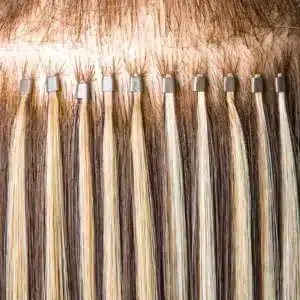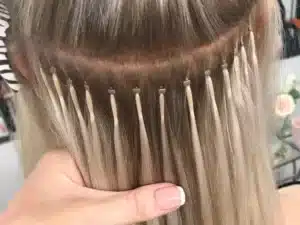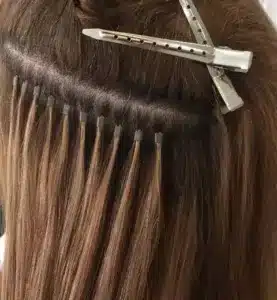As a professional stylist or salon owner, you’ve likely encountered the question, “Are hair extensions bad for your hair?” The answer isn’t as simple as a yes or no. Understanding how hair extensions interact with natural hair and the factors involved is crucial for making informed decisions for your clients. In this post, I’ll break it down to give you the full picture.
Hair extensions can be safe and beneficial for natural hair when applied and maintained properly. However, the key to preventing any potential damage lies in the type of extension, application technique, and maintenance. Poor quality extensions or improper care can cause damage, but with the right approach, extensions don’t have to be bad for your hair.
Want to know how to avoid potential damage while still offering your clients the beauty of extensions? Keep reading for a deeper dive into how the quality of the extensions and your technique can affect natural hair health.
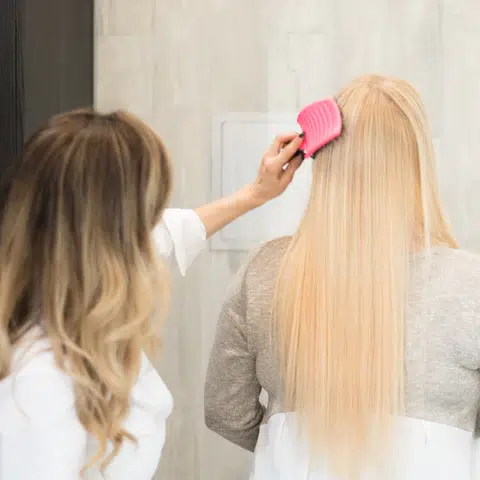
How Hair Extensions Can Affect Natural Hair
Hair extensions are an excellent way to boost volume and length, but improper application or care can lead to damage. Understanding how extension quality, technique, and maintenance play into this will help you protect your clients’ natural hair.
1. Extension Quality Influences Hair Health
One of the most significant factors that can impact whether extensions are harmful to natural hair is the quality of the extensions. High-quality, full cuticle hair extensions tend to be gentler on natural strands because they are better aligned and less likely to cause tangling or damage. In contrast, lower-quality extensions made from non-remy or synthetic hair can cause friction, leading to hair breakage and even scalp irritation. As a stylist, using premium extensions from a reliable supplier is key to ensuring that the extensions won’t harm your clients’ natural hair.
2. Application Technique Matters
The way you apply hair extensions plays a huge role in determining whether they’ll harm or benefit the natural hair. For instance, if you apply keratin bond extensions incorrectly or too tightly, it can cause breakage or even traction alopecia. For beaded weft extensions, improper placement can result in excess tension on the natural hair, leading to damage over time.

Can Extensions Damage Your Clients’ Natural Hair?
When applied improperly or neglected over time, extensions can cause damage. But with proper care and technique, the risk of harm is significantly reduced. Here are the major factors that determine whether extensions will harm natural hair:
Too Tight or Improperly Installed: Extensions that are too tight can cause traction alopecia. For example, tape-in extensions should be applied with the right spacing to avoid strain on the hair follicles.
Incorrect Removal: Removing extensions too aggressively can rip out natural hair, leading to thinning or breakage. Always ensure you’re using the right tools and techniques for removal.
No Breaks Between Applications: Keeping extensions in for too long without breaks can stress the natural hair. Give your clients some time without extensions to allow their natural hair to recover and grow.
So, are hair extensions bad for your hair? The answer is: not if they’re applied properly and maintained correctly. Extensions can be bad for hair only if the technique or quality is not up to standard.
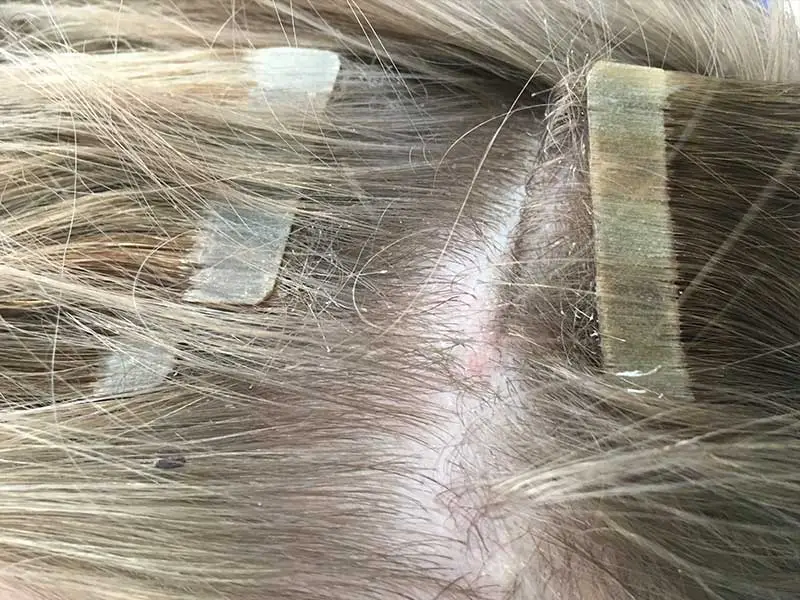
How to Ensure Hair Extensions Don’t Harm Natural Hair
As a stylist, you have the knowledge and tools to help clients enjoy extensions without compromising their natural hair health. Here’s what you need to do:
Use High-Quality Extensions
Clients’ hair health starts with the quality of the extensions. Opt for full-cuticle or high-grade Remy hair extensions to reduce the chances of tangling or causing friction with natural strands. As you probably know, higher-quality extensions are smoother and less prone to damage, meaning less friction on natural hair.
Educate Clients on Extension Maintenance
Proper maintenance is key to avoiding damage. Recommend regular touch-ups and moves for beaded weft extensions and keratin bonds every 6-8 weeks to keep tension at bay. Don’t forget to emphasize the importance of scalp health—clean hair and scalp are vital for keeping both natural and extension hair healthy.
Ensure Proper Heat Protection
Heat styling is a major culprit in hair damage. Advise your clients to use heat protectants before styling their extensions, and ensure they don’t use heat tools on extensions more than necessary. For keratin bond extensions, be especially careful as excessive heat can loosen the bonds and cause damage to both the extensions and natural hair.
Offer Scalp Treatments
Healthy hair starts with a healthy scalp. Encourage clients to keep their scalp clean, hydrated, and free from buildup. Regular scalp massages and deep conditioning treatments can help keep hair follicles in great shape and ensure that extensions remain in place without causing tension or damage.

Conclusion
So, are hair extensions bad for your hair? When done correctly, extensions can actually be a healthy addition to a client’s routine, offering protection from excessive styling and giving them the hair of their dreams. However, as with any service, it all comes down to technique, quality, and maintenance. By choosing high-quality extensions, applying them carefully, and ensuring regular upkeep, you can provide a safe, beautiful result that your clients will love without causing damage to their natural hair.
In short, extensions aren’t bad for hair—they’re only a problem if they’re poorly applied or improperly cared for. By following these professional guidelines, you can offer your clients the benefits of extensions while keeping their natural hair healthy and strong.
Hibiscus Hair Manufacturer has been dedicated to producing high-quality hair extensions for 25 years and is a recognized leader in the industry. If you are interested in finding a reliable hair extensions supplier and wholesale for your brand, please visit our website for more information:

